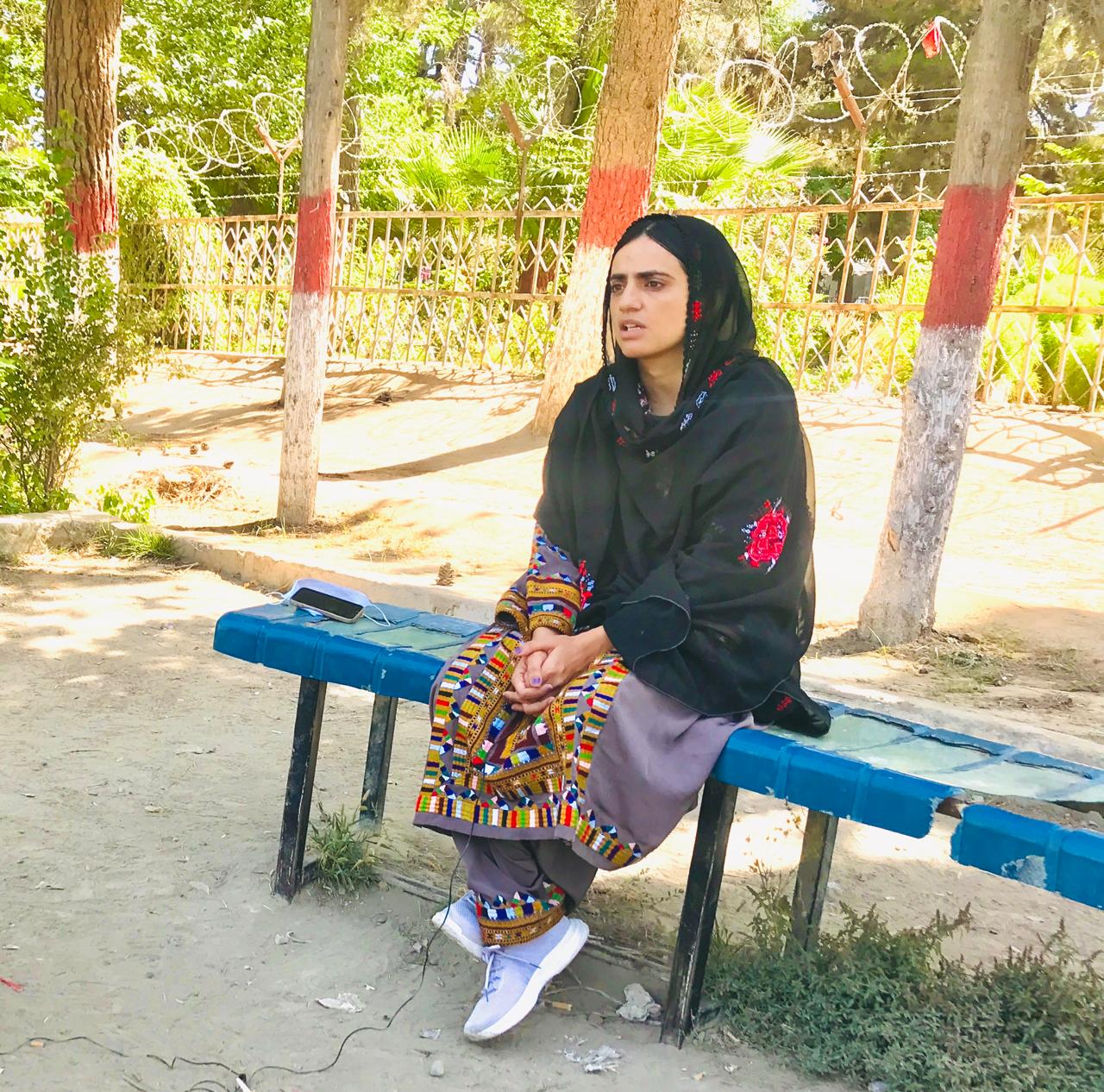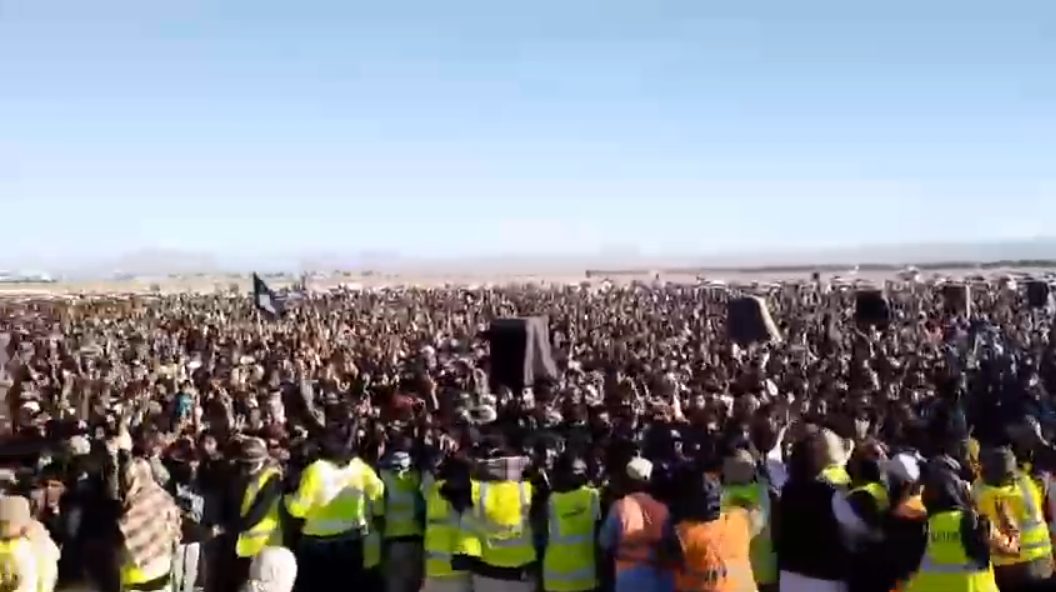Minds of the Movement
An ICNC blog on the people and power of civil resistance
by Ahmadullah ArchiwalJune 24, 2025
In ongoing tension, Balochistan province in Pakistan witnessed the deadliest attacks in the first quarter of 2025. The hijacking of the Jaffar Express train by the Balochistan Liberation Army caught everyone by surprise. The train was carrying approximately 440 passengers from Quetta to Peshawar. Also perhaps a surprise, a nonviolent struggle for Baloch rights has emerged from this situation, becoming a source of hope for the Baloch people—and a woman is leading it.
Mahrang Baloch is the face of this peaceful struggle, the Baloch Yakjihti Committee (Baloch Solidarity Committee), on behalf of the Baloch people. A doctor by profession, Mahrang Baloch is originally from Balochistan. She made the headlines for the first time when she led a peaceful protest against what the Baloch call forced disappearance of their relatives, allegedly by the Pakistani state. This was in 2009 after her father was abducted. She struggled for four years, but then slowed down her activities. Mahrang’s struggle resurfaced once again after Karima Baloch, a prominent female activist, was found murdered in Canada in 2020. Karima’s assassination was one of the high-profile assassinations of a Baloch person.
Meanwhile, parts of Balochistan are currently in the grip of an anti-state Baloch insurgency, who complain of the exploitation of their resources by the Pakistani state. The ongoing insurgency in Balochistan started after the assassination of Nawab Muhammad Akbar Khan Bugti, an influential politician and tribal chief. Since then, the Balochistan Liberation Army has been waging an insurgency against the Pakistani state. The Baloch Solidarity Committee, under Mahrang Baloch's leadership, has served as an alternative means of publicizing their grievances in a time when the mainstream media in Pakistan rarely covers their issues.

Mahrang Baloch. Credit: Amad Ahmad.
The roots of the Baloch conflict
Although the Baloch struggle is decades old, it is almost the first time that organized nonviolent tactics have been used on this scale by Baloch activists. Baloch nationalists have been at loggerheads with the state of Pakistan from day one. Balochs, who resist the state, believe that Pakistan annexed Balochistan in 1947, forcibly and against the will of the Baloch.
Since then, Balochistan has been the site of periodic armed conflicts between Pakistan and Baloch groups. The 1973 insurgency is one of the significant ones. This insurgency resulted in the death of 5,300 Baloch militants and 3,300 Pakistani troops. Nevertheless, the complaints of Baloch people from Pakistan appear to have continued, and in fact, intensified.
The deep mistrust between the small provinces of Pakistan and the federal government is a recurring issue in Pakistan. Baloch nationalists accuse the federal government of Pakistan of exploiting their resources and not giving the province their fair share of the money generated from their resources.

Screen capture of a video-recorded demonstration for the rights of Balochi people. Credit: Amad Ahmad.
Mahrang Baloch and the turn to nonviolent tactics
Unlike the Baloch Liberation Army, the Baloch Solidarity Committee employs nonviolent tactics. While little is publicly reported, the movement is believed to have a structure at the district level. These committees serve as a tool for mobilizing support for the movement among local people. The committee fosters a sense of solidarity among various sects of the Baloch population and unites them for collective action against what they label as injustices.
Mahrang and her fellow female activists regularly mobilize a large number of Balochs in their protests, sit-ins and marches. Pictured in this article are screenshots of videos captured by an activist of a large demonstration organized in Quetta a few weeks ago. The movement also organizes public actions in the national capital Islamabad and Karachi. Little has been written or researched on this movement, so we are reliant on anecdotal information from the ground, for now.
The government of Pakistan accuses Mahrang Baloch and the Baloch Solidarity Committee of destabilizing the situation in Balochistan province and of colluding with the armed Baloch resistance. Police arrested Mahrang during a recent protest, which she led against the burial of 13 unidentified youths. Mahrang insists that these people were the missing Balochs who had lost their lives after they were disappeared by the state agencies. The government of Pakistan has elevated pressure on both Mahrang and the Baloch Liberation Army after the hijacking of the Jaffar Express train, although no link between Mahrang and the BLA has ever been established.

Screen capture of a video-recorded demonstration for the rights of Balochi people. Credit: Amad Ahmad.
Dilemma, backfire and international solidarity
Mahrang has been able to attract international attention not only for herself but also for their cause: Mahrang was nominated for the Nobel Peace Prize in 2025. Previously, she earned a spot on the BBC’s list of the 100 most influential women and recognition from Time magazine as one of the world’s top emerging leaders.
The Baloch Solidarity Committee has been able to mobilize a significant number of Balochs, though estimates for recent demonstrations, captured in photos in this article, are not currently available. They have also been able to mobilize Balochs from all walks of life. Even Baloch politicians, such as Nawab Akhtar Mangal, the former Chief Minister of Balochistan, who is one of the few influential Baloch politicians and members of traditional Baloch power centers, have voiced their support for Mahrang and the movement, vowing to join the cause. This suggests growing disappointment with traditional political conduits more broadly.
More importantly, since Baloch culture holds women in tremendous respect and considers protecting them a matter of honor, Mahrang and her fellow activists challenge Baloch men to raise their voices for their rights. This equally puts the government in a dilemma. Since women are highly honored in Baloch culture, violence against women will trigger a more tremendous outcry from the Baloch population. Arresting them will boost public support for Mahrang and her fellow activists. On the other hand, allowing them to continue their nonviolent struggle makes the government appear weaker, as if it lacks control over governance. However, this does not mean that the situation will be rosy for the Baloch Solidarity Movement.
Looking forward
The challenges looking forward will be to ensure the continuity of the struggle in the context of escalating violence of other groups struggling for the same goals, by other means. On the international front, the attention that the Baloch Solidarity Committee attracted is unprecedented. However, the division between the nationalist Baloch and the Baloch who follows an accommodation policy with the Pakistani state will affect the success of the movement. The complex socio-political structures in Baloch society, as well as the possibility of harassment, surveillance and social isolation, even within their communities, will continue to loom over the movement.

Ahmadullah Archiwal
Ahmadullah Archiwal has two MAs, one in journalism and mass communication from the University of Peshawar (Pakistan) and one in international affairs from the New School University in New York (USA), where he studied as a Fulbright scholar. Archiwal has done pioneering work on civil resistance and has authored three books—two on Khudai Khidmatgar, and one on nonviolent civic mobilization in Pashto.
Read More